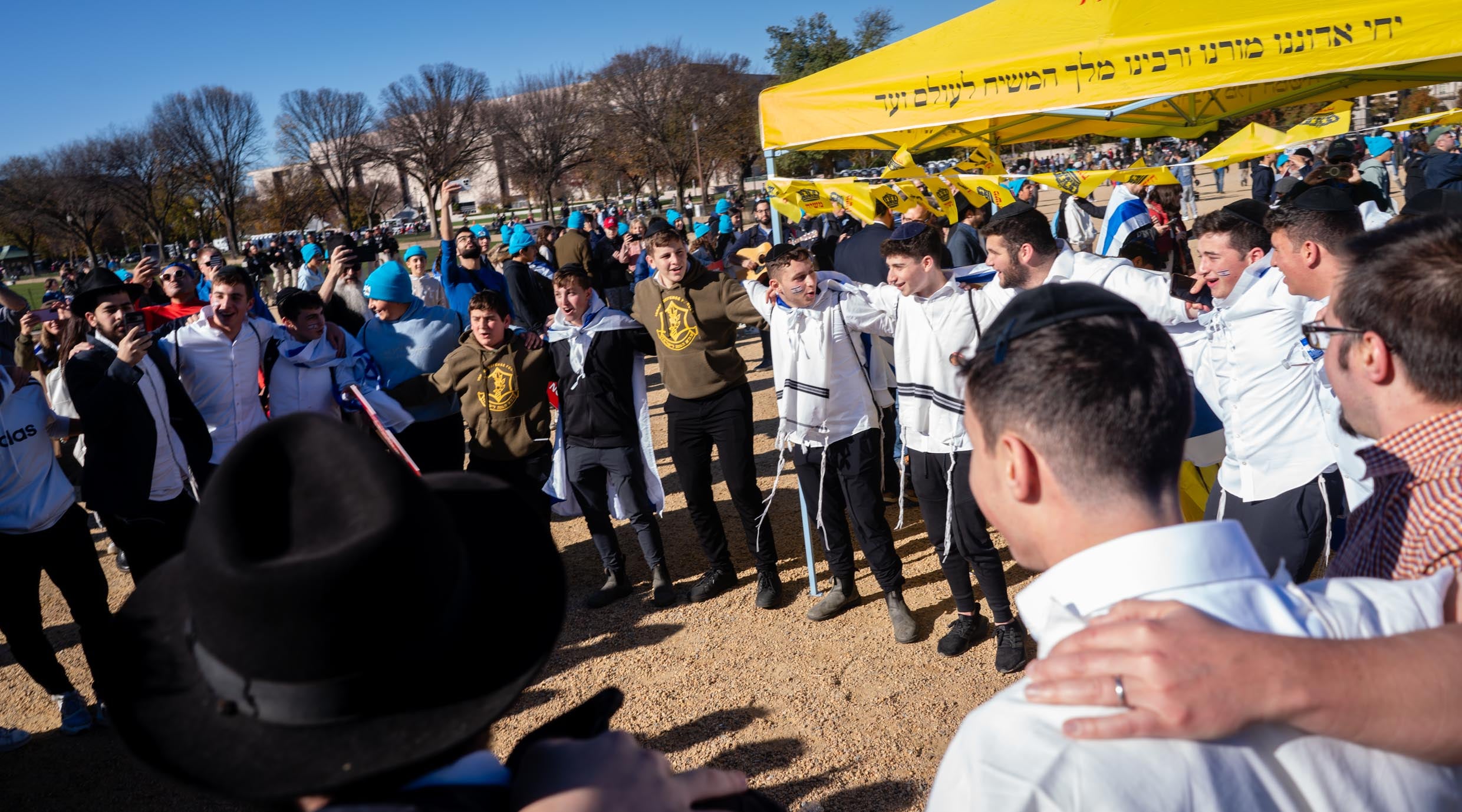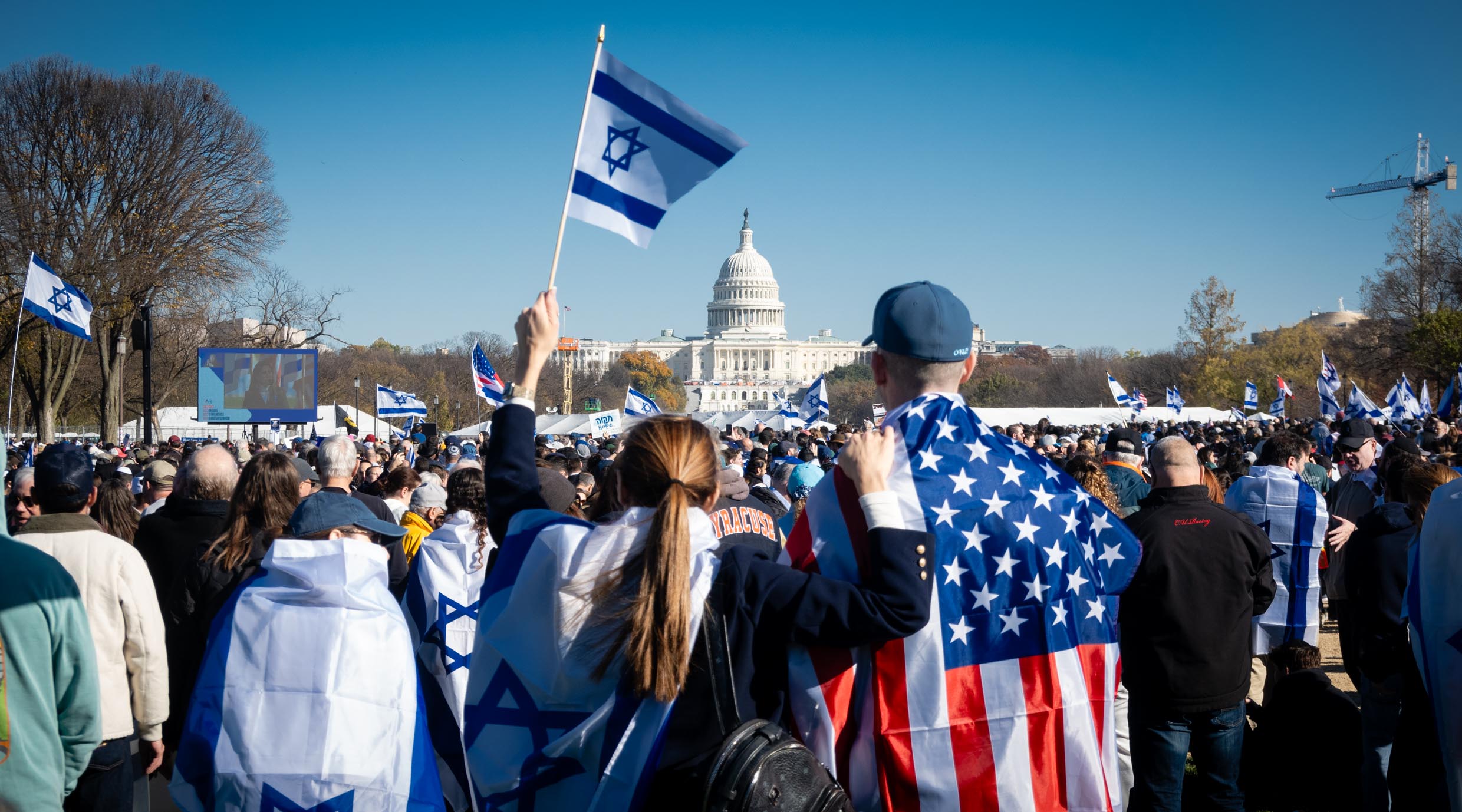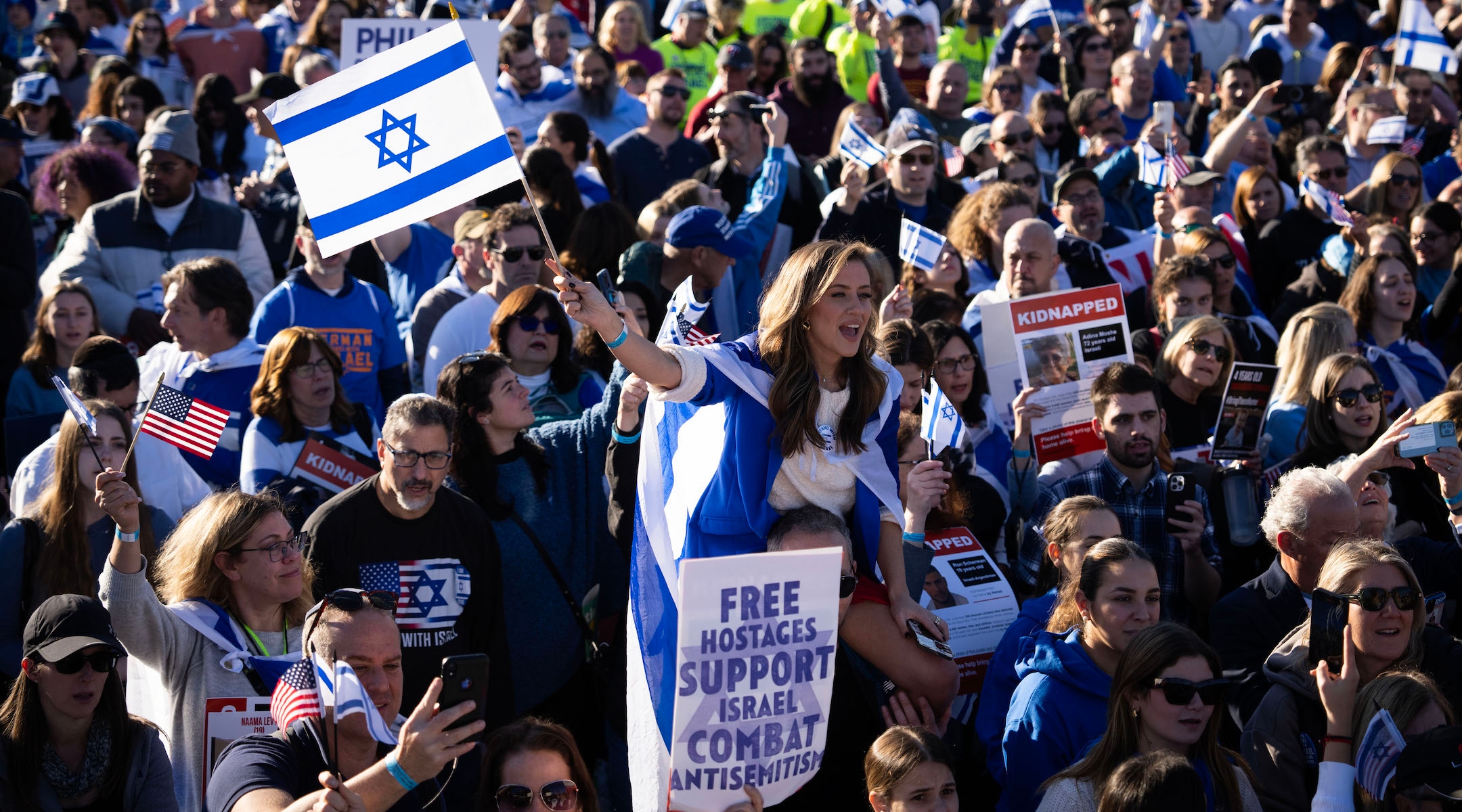(New York Jewish Week) — Congregants lined up in the morning cold outside the Stephen Wise Free Synagogue in the Upper West Side as the dawn broke Tuesday. Many of them held signs in support of Israel as well as supplies for the long day ahead as they boarded a large tour bus headed for Washington, D.C.
“This is an important act of unity and solidarity,” Rabbi Dalia Samansky told the passengers as the bus slowly made its way toward the March for Israel rally at the National Mall, as tens of thousands of other Jews from around the country headed toward the event. The Reform synagogue’s cantor, Daniel Singer, then played a rendition of “Tefilat haderech,” or “A prayer for the road,” on an acoustic guitar.
The congregants said they were inspired to make the long, trafficky trip to the rally to support the hostages held by Hamas, publicly back Israel, and take a stand against antisemitism as anti-Jewish discrimination surges in New York and elsewhere amid the fallout from the war. After event organizers announced a historic turnout of nearly 300,000 people at the rally, the participants said the event had bolstered their spirits and made a powerful statement in support of Jewish solidarity and Israel’s cause.
The group of marchers from Stephen Wise included synagogue members, some of their friends and family, and others who occasionally attend services. The contingent ranged in age from high schoolers to the elderly, and included several family groups. The synagogue’s chief rabbi, Ammiel Hirsch, is in Israel on a trip.
“I’m joining because I see the scary rise of antisemitism and I’ve been talking to people, and it’s just heartbreaking,” said Maxine Albert, a Manhattanite who sometimes attends services at the synagogue. “People are telling me that they’re not wearing anything that identifies them as Jewish.”
“It scares me and I want to stand up,” she added.
Samansky said the rally came as many congregants felt increasing pressure over their support for Israel, as many activists clamor for Israel to accept a ceasefire with Hamas and the memory of the terror group’s Oct. 7 atrocities fades from the public discourse. Many of the congregants also felt isolated and abandoned by their former allies on the left due to the lack of a condemnation for antisemitism, Samansky added.
“A lot of our congregants are really struggling with their own place in the world, their own place in the social justice world that they have believed and been a part of for so long, while also dealing with their fear of being Jewish right now,” she said. “More and more congregants are saying, ‘Should I wear my star? Should I have my mezuzah be so prominent?’”
“It’s so important to be at this [rally] to say we have a right to be Jewish, we have a right to be proud to be Jewish, we have a right to support Israel, and Israel has a right to be proud and to defend itself,” she said.

The March for Israel rally in Washington, D.C., November 14, 2023. (Luke Tress)
Several congregants said that the defaced and ripped up hostage posters around New York City were a reminder of the hostility around them, and some compared the tense atmosphere in the city to the rising antisemitism in prewar Europe. A number of attendees also cited the hostile atmosphere on college campuses as a worrying harbinger for the future.
“When I was growing up, it was [shortly] after the Holocaust, so antisemitism wasn’t considered to be mainstream. It had to be hidden,” said Joyce Goldwyn-Spencer. Now, she said, “so much time has passed and they have the excuse of using Israel, blaming Israel.”
“I think there is a sense of awakening,” said congregant Debra Warren, saying some U.S. Jews had become aware of “the Jew hatred that’s probably been simmering under the surface that’s now bubbled above the surface.”
The congregants firmly backed Israel’s need to defeat Hamas while mourning the Palestinian victims, and blamed much of the toxic discourse surrounding the conflict on a lack of nuance in the conversation and poor understanding of the complex issues at play in the region.
After the five-hour drive, the synagogue’s bus pulled into a parking lot at FedEx Field in North Englewood, Maryland, some nine miles east of the National Mall. The congregants spilled onto the asphalt to join throngs of other Jews and allies; the Stephen Wise group mostly broke apart as they mixed in with the thousands who made their way to the rally via shuttle, subway, taxi and on foot.
The masses in attendance at the rally included secular Jews and non-Jews, Haredim, school groups in matching shirts and Israelis navigating the crowds in Hebrew. Youths from the Chabad movement manned a tent, putting tefillin on passersby and handing out yellow balloons to high schoolers as young men wearing kippot danced in a circle nearby. Many in the crowd, framed on the lawn between the White House and the Washington Monument, carried U.S. and Israeli flags and photos of hostages. The crowd fell silent as families of the captives spoke, with some in the audience breaking into tears.

The March for Israel rally in Washington, D.C., November 14, 2023. (Luke Tress)
The crowd size — likely the largest Jewish gathering in U.S. history — was a powerful message for the congregation. “That’s what we needed, to make it really significant and historic,” Goldwyn-Spencer said.
Several congregants also said the support from public officials and non-Jews inspired confidence.
“It was exciting and beautiful to see Jews coming together,” Warren said, adding that the wide range of groups at the rally was affirming. “I think the hardest part has been the sense of feeling alone. As Jews, we have each other.”
“I never thought that we would need to do this but the time is now so I’m glad to be there,” said congregant Michael Sherman, adding that he was cheered by “Jews putting arms around each other, helping each other — secular, Orthodox.”
On the way back to the parking lot, young Israelis and Haredim alighted on the subway together as a group of high schoolers sang. The Stephen Wise delegation boarded the bus back to New York, and the cantor, Singer, played “Oseh Shalom” as two teenagers passed out bags of chocolate chip cookies to the weary congregants.
“This isn’t 1939. We’re not going to stay silent in the face of antisemitism. We are going to stand up, we are going to protect ourselves and be proud of who we are,” Samansky said. “We’re determined to continue speaking out and being present and reminding the world that we are here and we have the right to be here.”
The New York Jewish Week brings you the stories behind the headlines, keeping you connected to Jewish life in New York. Help sustain the reporting you trust by donating today.





